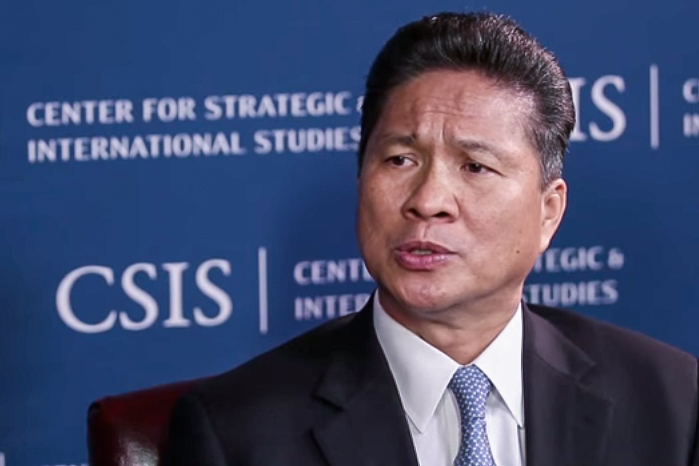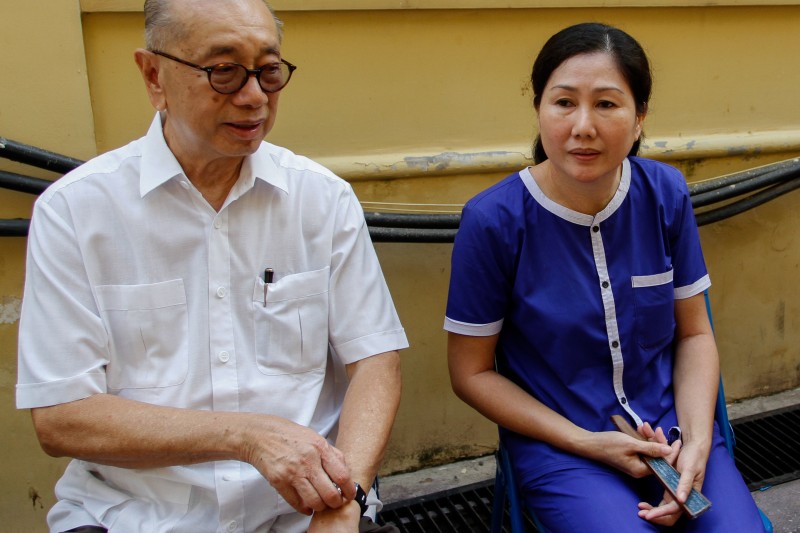When the National Assembly meets today to approve the prime minister’s second cabinet reshuffle since the last election, it will be a case of back to the future for outgoing Commerce Minister Sun Chanthol.
Only 2 1/2 years after he romped back into cabinet as the paragon of the CPP’s reform agenda following near electoral defeat, the Ivy League-educated businessman is headed back to his old job as transport minister.

It’s a move that has been widely praised, with Mr. Chanthol expected to take the zeal he brought to encouraging foreign investment and shift it to improving the nation’s roads—a vote-winner for the ruling party as elections near in 2017 and 2018.
Yet lingering in the background has been an increasingly nasty criminal dispute between Mr. Chanthol and his in-laws, a case that has in many ways come to symbolize a great anxiety for foreign investors in Cambodia: the unpredictable and thorny legal system.
In an old feud that has flared up over the past year, the family of Mr. Chanthol’s father-in-law Khaou Chuly, one of the country’s richest men, has accused the minister of using his clout to secure family inheritance by inventing the tale about an attempt to murder his wife and daughter.
At stake is the vast business empire that is Khaou Chuly Group (KCG)—and the investments it has brought to Cambodia, including a $300 million cement project with Thailand’s Siam Cement and controversial rubber plantations with the Belgian company Socfin.
The ugly feud among powerful families, which has brought out the worst claims about the pliability of Cambodia’s legal system, has been a bad look for the man charged with attracting investment, CNRP lawmaker Eng Chhay Eang said on Sunday.
“Usually, the investors, before investing money in our country, have to look at all aspects, including the judicial system,” Mr. Chhay Eang said.
“So if the judicial system is unfair, they would have no trust in the event they have a commercial dispute. The case of Sun Chanthol and his family is a specific case, but the case is a reflection.”
Attempted Murder
When Mr. Chanthol was appointed as Prime Minister Hun Sen’s new commerce minister in September 2013, taking over from Cham Prasidh, who had been in the position for 15 years, the legal dispute with his in-laws seemed finished.
Mr. Chuly’s wife, Khaou Seng Chanda, was languishing in jail, sentenced to 20 years for arranging the plot to kill Mr. Chanthol’s wife, Sun Sotha, and daughter, who was 9 years old at the time. In a six-month trial, Ms. Seng Chanda was found guilty of ordering her maid to conspire with Ms. Sotha’s to carry out the crime.
The maids, the court was told, plotted to feed Ms. Sotha and the family’s dogs sleeping pills, before leaving a window ajar for two men to come in and rape and kill her. The plan fell apart when Ms. Sotha awoke and closed the window, foiling the conspiracy.
None of the suspects was seen at Mr. Chanthol’s home on the night in question, and the only evidence was the open window. The maids, Chan Sokha and Neang Sinath, initially denied the claims, and one accused Mr. Chanthol of orchestrating a “setup” and having police intimidate her into confessing.
It was a refrain that rang out through the trial.
“This was set up by Chanthol based on an internal family dispute,” Mr. Chuly himself told reporters outside court in January 2011, claiming Mr. Chanthol offered to drop the charges against his wife if he instead implicated his eldest son and heir, Khaou Phallaboth.
“It’s clear that this happened because they were worried about my father’s property,” added Mr. Phallaboth, who took over the day-to-day running of the KCG company from his aging father in the 1990s.
“I plea to you Sun Chanthol, stop doing these things. I kneel down to you three times,” he said.
“It is a setup case,” Ms. Seng Chanda’s lawyer Kar Savuth said. “It is a false accusation, because Ms. Sokha and Ms. Sinat [the two maids] told the court that it was set up by Sun Chanthol and that my client, Ms. Seng Chanda, did not order them to commit this crime.”
“Their invented evidence is inconsistent, and their real evidence is not logical,” Mr. Savuth said of the plaintiffs.
With the maids suddenly recanting their denials and admitting to the crime during appeals in September 2011, Ms. Seng Chanda’s guilty conviction was upheld in the Supreme Court in October 2012—almost a year before Mr. Chanthol was named commerce minister.
“Please let me say that Sun Chanthol and Sun Chanthol’s family do not want one cent from Oknha Khaou Chuly,” Mr. Chanthol told reporters in an impromptu 10-minute speech outside the court.
“This shows that money can’t buy justice. It is only the law that delivers justice to the victims,” he added.
Sentencing of the Heir
With the case fading from the limelight in 2012 as the 2013 election approached, the courts re-opened the case to investigate the role played in the attempted murder plot by Mr. Phallaboth and his de facto wife, Lay Huong.
With no further public hearings, and Mr. Chanthol becoming the commerce minister, Mr. Phallaboth in February 2014 penned a letter apologizing for accusing the minister of fabricating the case and instead implicating Ms. Seng Chanda and Ms. Huong.
“His Excellency Sun Chanthol and Her Excellency Sun Sotha never wanted property from Khaou Chuly’s family, not even one dollar,” Mr. Phallaboth wrote, describing his previous claims as “absolutely wrong.”
As Mr. Chanthol continued making a name for himself as the government’s face of the reform, promoting Cambodian trade on Bloomberg TV and going on an investment tour of the U.S. with then-Ambassador William Todd, the case was reignited in December 2014 when Ms. Huong was arrested in Thailand.
Ms. Huong said Mr. Phallaboth had decided to pivot after their split and work with Mr. Chanthol in order to ensure that he gained control of the former couple’s shared business interests.
“My husband Khaou Phallaboth and His Excellency Sun Chanthol planned to create this story and arrest me,” Ms. Huong told the Appeal Court in March 2015. “This case was completely made up.”
In a bizarre twist, on the day Ms. Huong’s trial began, the Phnom Penh Municipal Court announced that Mr. Phallaboth had also been charged in the case and would face the same charges of attempted rape and murder.
Both Mr. Phallaboth’s letter and the testimony of the maids from 2011 were presented in ensuing hearings, with Judge San Sophat pointing to the corroborating claims as evidence of their veracity.

Ms. Huong told the court she could not believe it was relying on the testimony of the two maids, asking why judges had not given equal consideration to their claims of pressure from Mr. Chanthol.
“The witness also said His Excellency San Chanthol planned to have her accuse Ms. Seng Chanda and Huong,” Ms. Huong told the court. “When Chan Sokha said [Mr. Chanthol] was the mastermind, why wasn’t he called?”
It remains unclear when Mr. Phallaboth, who had been living outside the country, was charged, and the case against him relied almost entirely on the testimony of one of the maids.
For Mr. Chuly, the aging patriarch, the case remained about his fortune and Mr. Chanthol’s desire to secure a significant share of it.
“On June 19, 2010, Sun Chanthol …told me that Seng Chanda wanted to kill me and Lay Huong wanted to kill Khaou Phallaboth,” Mr. Chuly said in a statement that was read to the court during a final hearing in February.
“At that time, I knew that His Excellency Sun Chanthol had prepared this plan because he wanted my property and was afraid my wife would get it.”
A Minister’s Image
Over his time in charge of the Commerce Ministry, Mr. Chanthol has implemented a number of reforms that have been widely praised by investors, including an electronic business registration system to cut down on graft.
In emails on Sunday, Mr. Chanthol did not respond to questions about whether his return to the transport ministry was linked to the messy legal dispute.
“Please stop writing sensational story. As a professional journalist, you should check all the facts before writing,” he wrote, linking to articles about the cabinet reshuffle in local media.
The articles do not discuss Mr. Chanthol’s legal cases or how they might impact investor confidence. One article, from the Khmer Times, said the move was simply a necessity to fix the Transport Ministry.
“The three articles answer your questions. You should also check with the CDC for the FDI we successfully attracted and approved,” Mr. Chanthol said, referring to foreign direct investment figures from the Council for the Development of Cambodia (CDC).
CDC Secretary-General Sok Chenda Sophea could not be reached on Sunday.
Ou Virak, a political analyst and founder of the Future Forum think tank, said Mr. Hun Sen did not appear concerned about image problems with Mr. Chanthol—even if his case might make some anxious about investing in Cambodia.
“Well, I would be [anxious],” he said. “But I don’t know about Hun Sen because he made him commerce minister in the first place, and this case has been around for a while. He seems to have earned the trust of Hun Sen.”
“Even with all that going on, he’s still found himself in a ministry,” Mr. Virak said of Mr. Chanthol, arguing that the move to the Transport Ministry was not a demotion.
“It’s domestically more important,” he said.



